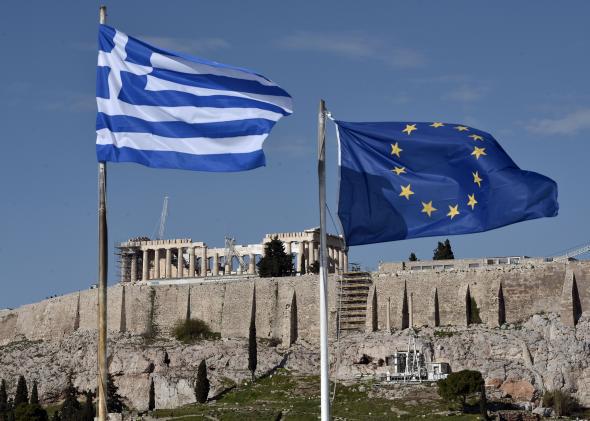It looks like Greece’s game of chicken with the European Union will continue for at least the rest of this week, as bailout negotiations between the two sides collapsed yet again Monday. The parties walked out of discussions after Greek officials shot down a draft agreement that they called, among other things, “absurd,” “irrational,” and “unacceptable.” This is the second time in less than a week that high-level talks have ended without progress. However, there seems to be a strong chance they will all sit back down for another meeting on Friday.
Here’s the basic outline of where things stand now: Greece’s current bailout deal, complete with its demands for fiscal austerity, expires on Feb. 28. Without additional help, the Greek government could run out of cash shortly thereafter, which could force it to leave the euro. (That would give Athens the power to print its own currency, but at the likely cost of a massive financial crisis.)
To avoid such a scenario, Greece’s newly elected, leftist government—which ran on a staunch anti-austerity platform aimed at ending the old bailout—wants a short-term “bridge loan” with fewer budget conditions attached that could tide the country over until its leaders can work out a permanent deal with its European lenders. However, EU lenders would prefer to temporarily extend the current agreement during talks. Monday, as the Wall Street Journal and others report, they asked Greece to agree to a six-month continuation. Greece said no thanks, which is less than surprising. Earlier this morning, its finance minister, Yanis Varoufakis, published an op-ed in the New York Times reiterating that Greece wasn’t bluffing when it said it wanted to end the current bailout. To wit:
The “extend and pretend” game that began after Greece’s public debt became unserviceable in 2010 will end. No more loans — not until we have a credible plan for growing the economy in order to repay those loans, help the middle class get back on its feet and address the hideous humanitarian crisis. No more “reform” programs that target poor pensioners and family-owned pharmacies while leaving large-scale corruption untouched.
It’s pretty hard to publish that paragraph, then agree to an extension.
So, where does that leave things? For what it’s worth, I don’t think it’s quite time to hyperventilate about a Grexit. All sides theoretically need to reach an accord by Friday, so that parliaments in Germany and elsewhere can have time to approve it. Assuming that’s a hard deadline, it makes sense for Europe’s leaders to push talks as close to the brink as possible to increase pressure on Greece (just ask our own Seth Stevenson). If, for instance, depositors begin to pull money out of Greek banks in the coming days, it could make the government more desperate for a deal.
I’m not saying I approve of trying to induce a minor financial panic in order to win a negotiation. I’m just saying, there’s a logic to it.
In the meantime, there have already been glimmers of what a potential compromise might look like, once both sides decide they’re truly out of time for posturing. It may be possible, for instance, to play around with the current bailout so that any new loans would legally qualify as an “extension,” even if the terms are vastly different. Meanwhile, Greece would (very reasonably) like to be allowed to run a smaller primary budget surplus (that is, run a smaller surplus before debt repayments). Monday, during a press conference, EU officials said there was “some flexibility” in the current bailout on that front. There should be room for both sides to budge here.
On the other hand, maybe Congress’ habit of striking last-minute deals when faced with potential doom has me feeling overly optimistic. When you push these confrontations to the brink, there’s always a chance you’ll fall over it.
